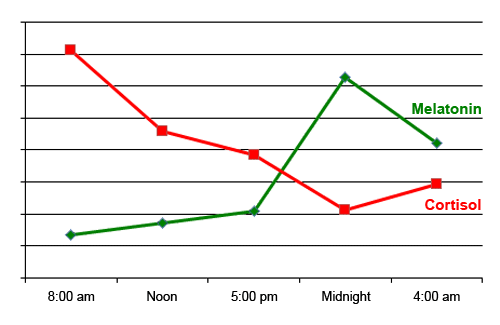It seems like every time I turn around these days I come across another book about the adrenal glands. Who knew that these tiny little glands that sit atop the kidneys could be so interesting?
The latest tome to grace my nightstand is entitled The Adrenal Reset Diet: Strategically Cycle Carbs and Proteins to Lose Weight, Balance Hormones, and Move from Stressed to Thriving, by Dr. Alan Christianson, NMD. Here are the key messages that I got out of his book.
The adrenal glands produce cortisol, the hormone that opens up cell walls to let other hormones in. They are also implicated in regulating our electrolyte balance, immune function, fight-or-flight response, blood sugar, and sleep-waking cycles. The latter is of particular interest to me.
The adrenal gland works in tandem with the pineal gland to manage our circadian rhythm – that is, our wakefulness and sleepiness across a given 24 hour day. The adrenal gland produces cortisol which acts as a stimulant. The pineal gland produces melatonin, which makes us sleepy. When we’re operating at peak efficiency, our blood levels of these two compounds looks something like this:
We run into trouble when our cortisol is too low in the morning, thereby denying us that jolt of energy that we need to greet the day and sustain our energy. We also suffer if we get an undesirable boost of cortisol in the evening, causing us to be wakeful when we should be sleeping.
According to Dr. Christianson, meals with a higher percentage of protein and fat cause more cortisol to be released as an aid to digestion. It also has the effect of decreasing fat storage. By contrast, a higher intake of carbohydrates causes less cortisol to be released. With that in mind, he advocates the following pattern of eating:
|
Breakfast |
Lunch |
Dinner |
|
| Protein |
One serving (roughly the size of the palm of your hand) |
||
| Fat |
One smallish serving |
||
| Carbohydrate |
1 serving |
2 servings |
3 servings |
Carb cycling keeps the cortisol levels at the proper levels given the time of day.
Protein must be high quality protein – e.g., free range poultry, grass-fed beef, mercury-free fish, protein powder (from a reputable source). Carbohydrates must come from whole fruits, vegetables, legumes, grains, and nuts. No processed foods! Whole foods with a high fiber to fructose ratio are preferred.
Skipped meals are a big no-no. It amps up cortisol as a means of helping the body adjust to its depleted energy resources. This is bad news for those of us who don’t feel hungry in the morning! However, his protein shake recipe looks appetizing and relatively easy to prepare: 1 scoop protein powder, 1/4 cup berries, 1 cup unsweetened nondairy milk, 2 TBSP flax seeds, 1 handful of frozen spinach, and 1/4 cup cooked navy beans.
Dr. Christianson favors outdoor exercise where possible. Apparently, fresh air is good for the daily biorhythms. Exercise should be limited to yoga or walking after 2 pm to avoid an inauspicious jolt in cortisol. A gentle 10-15 minute walk after dinner helps the body prepare for sleep.
The optimal biorhythm? Early to bed (no later than 10 pm) and early to rise… Not so good for the night owls among us!
